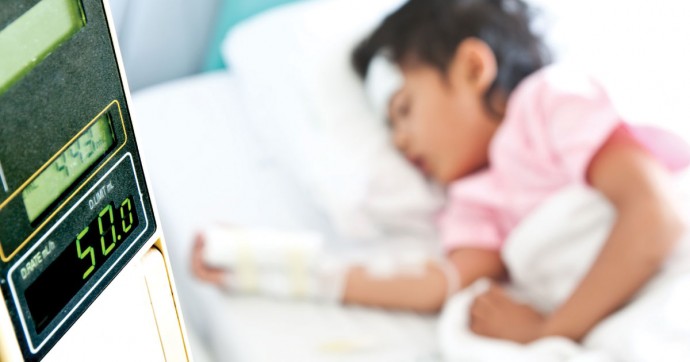Meningococcal meningitis is a serious infection of the meninges (a thin lining enveloping the brain and the spinal cord). It is a bacterial form of meningitis, caused by Neisseria meningitidis bacteria. It can cause brain damage and result in death if the proper treatment is not provided. The bacteria are transmitted between individuals through respiratory droplets or throat secretions. Common symptoms are headaches, confusion, high fever, sensitivity to light, stiff neck, and vomiting. Statistics have shown that 5-10% patients of meningococcal disease die within 24-48 hours after the onset of symptoms, while 10-20% of survivors suffered brain damage, hearing loss, or limb loss. Emma tells the story of her beautiful baby girl and the fight they had against meningococcal meningitis.
The story of Hana
14-month-old bubbly energetic Hana was always moving and exploring everywhere. “I have just survived a brain tumour surgery a few months before, so I thought nothing could be worse than that. My baby Hana was the one who kept me going, and made me stay strong to face my fear,” said Emma, her mother. One night, Hana kept waking up due to a fever and runny nose. Emma initially thought that it was due to her new tooth, so she checked her temperature and gave her some medication. Hana seemed better the next day and ate breakfast as usual.
However, at noon, her temperature increased. She became very lethargic and kept vomiting. Emma and her husband immediately rushed Hana to the hospital. The doctor made preliminary check-ups, and took some blood from Hana for testing. Hana kept vomiting every time she was given liquid, so she was put on drip. The blood test results showed a sign of infection, but they are still unsure of her condition. “We kept asking everyone, what was wrong with our baby, but no one could give us a straight answer,” Emma continued.
In the following hours, Hana’s condition worsened. “I tried sitting her up to feed her since she had not eaten for some time, but she let out a high-pitched cry. It was very unusual. She was very limp and could barely lift her neck. I also noticed purple blotches appearing on her skin,” Emma described. Hana was then immediately taken to the intensive care unit. More tests were done, including a lumbar puncture. Hana was attached with numerous tubes and wires. “It broke my heart to see Hana in that condition, without being able to do anything to help her. They finally confirmed she had meningococcal meningitis,” expressed Emma.
Hana was given a high dose of antibiotics and medications, but her condition still did not improve in the following days. Her arms started turning black, and on the seventh day of admission, the doctors told Emma to be prepared for all possibilities. They informed that even if Hana survived, she would probably lose some parts of her limbs. “I was so devastated to hear that. I thought about all the things that I have yet to do with her.” After a number of operations, Hana had her left arm below the elbow and all the fingers on the right hand amputated. Hana was finally discharged after two months. She fortunately recovered from the infection, but the effect it left on her is severe. Other than her disabled hands, Hana might have learning difficulties in the future. “I wished I could have done something to prevent all these. She survived and that is all that matters to us now,” Emma said.
According to Dato’ Dr Musa Mohd Nordin, meningococcal meningitis is a dangerous disease and can be difficult to diagnose because the early signs and symptoms, namely fever, vomiting, irritability and lethargy are non-specific. “The best way to prevent it is by having your child vaccinated with the meningococcal vaccine,” explained Dr Musa. Approximately up to 10% of the population is believed to carry N. meningitidis in their throat at any given time. Carriers might not be infected but they can transmit these bacteria to others, especially during close contacts and mass gatherings, such as during the Haj and Umrah pilgrimage. Babies and young children, having a weaker immune system than adults, are highly prone to infection. Frequent travellers, especially to the meningitis belt in sub-Saharan Africa, and students living in dorms are also at risk of being infected.
“Apart from the child, families are also recommended to take the vaccine, not just to protect themselves from the infection, but also to protect the child by herd immunity,” added Dr Musa. Herd immunity can provide a measure of protection for individuals who have not yet developed immunity to the infection. If infected, meningococcal meningitis can be fatal or cause serious complications like in Hana’s case. Although the vaccine is not a part of the mandatory Malaysian National Immunisation Programme, it is a recommended vaccine and can be taken at public or private hospitals. Talk to your doctor to know more about this and to prevent you and your family from this distressing illness.







Comments